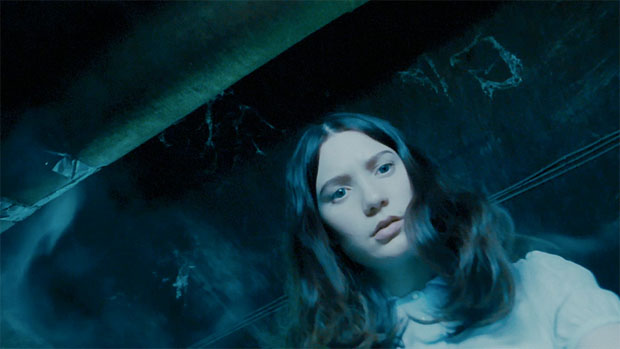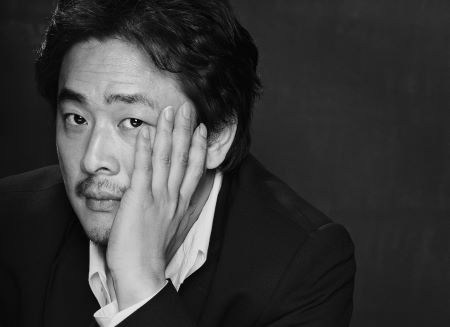 Back to selection
Back to selection
Five Questions with Stoker Director Park Chan-wook
 Stoker
Stoker Stoker, South Korean filmmaker Park Chan-wook’s long-awaited English-language debut, has already proven divisive, its moral murkiness and arguable cynicism as beguiling to some as they are troubling for others. But however one feels when walking away from this Gothic, slow-burning psycho-thriller, which explores the curious workings of its titular family (the surname’s an intended nod to a certain vampire-loving author), it’s hard to deny that it’s the work of a master stylist, whose obsessive attention to detail is intoxicating, and, these days, far too rare. A parade of pristine compositions, technical flourishes, and production design that’s adamantly era-nonspecific, Stoker plays like a très chic tribute to Hitchcock (most obviously Shadow of a Doubt), with a worldly touch of class and a trio of performances (from Mia Wasikowska, Nicole Kidman, and Matthew Goode) in perfect step with the curious tone.
Breezing through New York to promote his inaugural stateside effort, which just broke out in limited release and will continue to widen through March 15, Director Park (as all of his colleagues call him) sat down with Filmmaker to discuss the movie, his translator faithfully in tow. The auteur, who’s of course responsible for worldwide cult classics like Oldboy, shared his vision for Stoker, his thoughts on movie violence, and just how conscious the film’s Hitchcockian elements were.

Filmmaker: What most people are going to take away from this film is that it’s beautifully, impeccably made. How would you describe the aesthetic?
Park: As I was reading the script [by actor Wentworth Miller], there were some keywords that came to my mind. They were: fairy tale, myth, picture book, dream, nightmare, and coming-of-age story. These were the most important aspects of the script, and I strongly considered all of them when creating the aesthetic landscape of the film. India [played by Mia Wasikowska] is a very sensitive young girl. And she’s very particular. For girls her age who come and see this film — girls who are just as, you might say, sensitive, or particular, as girls her age tend to be — film as elegant as possible. I felt like I was a jeweler crafting this jewel in a very meticulous and very detailed manner. I wanted to finish off this jewel very beautifully.
Filmmaker: You’re widely known for your “Vengeance” trilogy (Sympathy for Mr. Vengeance, Oldboy, and Sympathy for Lady Vengeance), which charts how someone’s revenge can affect the world around them. Do you see India and the world around her as being similar to the characters and circumstances in those three films?
Park: The film lends itself to such an interpretation, but it is not the only interpretation. The very act of [spoiler alert!] India killing Uncle Charlie [played by Matthew Goode] can be interpreted in so many ways. You can interpret it, for instance, as an act of vengeance for someone who killed her father. And you could view it as an act of saving a mother, as Uncle Charlie was about to kill India’s mother [played by Nicole Kidman] and she wanted to save her. You could also, just as well, view it as an act of expiring a mentor who lived out his use-by date. By killing Uncle Charlie, India is engaging herself in a sort of graduation ceremony: “Here I am, I learned everything from you, I don’t need you anymore. Be proud of me, your graduated student, as I am completing my journey. And this is how I’ll show that to you.”
Filmmaker: I understand that Vertigo is the film that inspired you to become a filmmaker. Do you see Stoker as a movie that pays homage to Hitchcock?
Park: Hitchcockian influence is really something that Wentworth was under when he was writing Stoker. And because I could see how much influence of Hitchcock, or Hitchcockian elements, there was in the script, that was actually something I wanted to avoid rather than subscribe to. It’s not something that I do in making my own films — make obvious references to other filmmakers — but I quickly realized that there’s something structurally inherent in Stoker that has a Hitchcockian influence. It’s actually very much a part of the makeup of these characters, so much so that if one wanted to really take away the Hitchcockian elements or references, it would end up being a completely different film. So I felt like, “Okay, I’ll accept this, and not only accept it, but turn it into one of the enriching aspects of the film, fostering its multiple interpretations.” It’s a case of me choosing to do this film, and choosing the script, not because of the Hitchcockian elements, but despite the fact that it had Hitchcockian elements in it.
Filmmaker: How did you feel about those elements when watching the finished film?
Park: Well, I didn’t want to add any more Hitchcockian elements or references than were already found in the script, but I couldn’t take any away from it without taking away the integrity of the story. But having finished the film, now, I realize how much unwitting Hitchcockian elements were added. For instance, the stuffed birds in the study, well guess which Hitchcock film that comes from. Also, Matthew Goode evoked Anthony Perkins — same film. Just days after watching the finished cut, I watched a Blu-ray copy of Marnie. Marnie is a film I saw a very long time ago, without any subtitles, so I’d forgotten about it altogether almost, but just because some Blu-Ray copies of Hitchcock [movies] were given to me, I thought, “I haven’t seen Marnie for a long time, why don’t I just pop it into the Blu-ray player and watch it?” And, to my amazement, I saw some similarities between Marnie and Stoker. So there were all these different elements that I didn’t intend, but that one may pick up if making comparisons between Stoker and works of Hitchcock. And, in thinking about this, I was also wondering, “Perhaps audiences might be able to pick up influences other than Hitchcock in Stoker. Isn’t that entirely possible?” Because all of this a function of coincidence, and a function of Hitchcock being no longer just a filmmaker, or just a name, but a genre unto itself. “Hitchcock” is now a genre, so much so that even if you’re a filmmaker who’s never seen a Hitchcock film in your entire life, if you’re making a thriller film, people might come up to you and say, “I saw some Hitchcock references or Hitchcock elements in your film.”
Filmmaker: Given the scrutiny that violent films are increasingly receiving in our global culture, has anything changed within you regarding the films that you want to make, or how you want to make them?
Park: I don’t think I’m affected in any way by this scrutiny. In terms of many cultural media, such as cinema or TV, I feel that violence is a subject matter that really needs to be explored further, because violence is very much a part of our life, and one of the more important parts of life that needs to be explored to be understood. And compared with how much, in reality, it is a part of our world, it is a subject matter that is not studied enough. That’s how I feel about it. There are humans, first and foremost, and there are works of art which explore and study the human condition. And then there’s the critique of those works.
